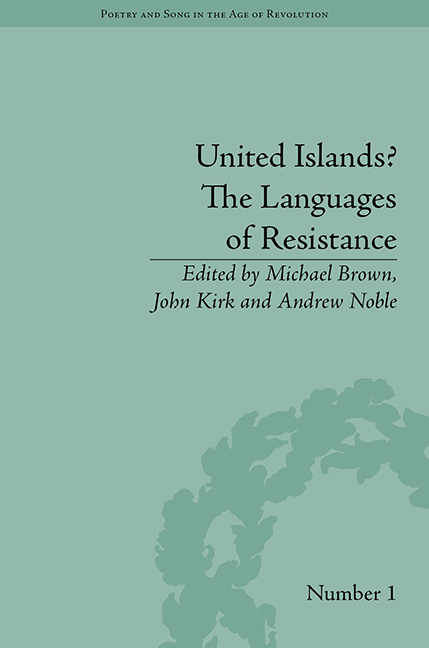Book contents
- Frontmatter
- CONTENTS
- Acknowledgements
- List of Figures and Tables
- List of Contributors
- Introduction: The Languages of Resistance: National Particularities, Universal Aspirations
- 1 Reading the English Political Songs of the 1790s
- 2 Why should the Landlords have the Best Songs? Thomas Spence and the Subversion of Popular Song
- 3 ‘Bard of Liberty’: Iolo Morganwg, Wales and Radical Song
- 4 Canonicity and Radical Evangelicalism: The Case of Thomas Kelly
- 5 Charlotte Brooke's Reliques of Irish Poetry: Eighteenth-Century ‘Irish Song’ and the Politics of Remediation
- 6 Homology, Analogy and the Perception of Irish Radicalism
- 7 Lost Manuscripts and Reactionary Rustling: Was there a Radical Scottish Gaelic Poetry between 1770 and 1820?
- 8 Virile Vernaculars: Radical Sexuality as Social Subversion in Irish Chapbook Verse, 1780–1820
- 9 Thomas Moore and the Problem of Colonial Masculinity in Irish Romanticism
- 10 Radical Politics and Dialect in the British Archipelago
- 11 ‘Theaw Kon Ekspect No Mooar Eawt ov a Pig thin a Grunt’: Searching for the Radical Dialect Voice in Industrial Lancashire and the West Riding, 1798–1819
- Afterword: The Languages of Resistance
- Notes
- Works Cited
- Index
7 - Lost Manuscripts and Reactionary Rustling: Was there a Radical Scottish Gaelic Poetry between 1770 and 1820?
- Frontmatter
- CONTENTS
- Acknowledgements
- List of Figures and Tables
- List of Contributors
- Introduction: The Languages of Resistance: National Particularities, Universal Aspirations
- 1 Reading the English Political Songs of the 1790s
- 2 Why should the Landlords have the Best Songs? Thomas Spence and the Subversion of Popular Song
- 3 ‘Bard of Liberty’: Iolo Morganwg, Wales and Radical Song
- 4 Canonicity and Radical Evangelicalism: The Case of Thomas Kelly
- 5 Charlotte Brooke's Reliques of Irish Poetry: Eighteenth-Century ‘Irish Song’ and the Politics of Remediation
- 6 Homology, Analogy and the Perception of Irish Radicalism
- 7 Lost Manuscripts and Reactionary Rustling: Was there a Radical Scottish Gaelic Poetry between 1770 and 1820?
- 8 Virile Vernaculars: Radical Sexuality as Social Subversion in Irish Chapbook Verse, 1780–1820
- 9 Thomas Moore and the Problem of Colonial Masculinity in Irish Romanticism
- 10 Radical Politics and Dialect in the British Archipelago
- 11 ‘Theaw Kon Ekspect No Mooar Eawt ov a Pig thin a Grunt’: Searching for the Radical Dialect Voice in Industrial Lancashire and the West Riding, 1798–1819
- Afterword: The Languages of Resistance
- Notes
- Works Cited
- Index
Summary
This chapter discusses how Scottish Gaelic poetry engages with political Radicalism between 1770 and 1820, and also whether Gaelic poetry can be considered oppositional or contrary, both within the Gaelic community itself, and in terms of the relationship between the Gaelic community and the ideological narratives of the rest of Britain during the period. A cautionary note to begin: what might appear radical in British terms frequently turns out to be a reaffirmation of a conservative position in Gaelic terms, and vice versa; therefore, when looking for ‘Radicalism’, you often discover (small r) radicalism: opposition to change; a desire to return to radices, ‘roots’. The temptation is to imagine Gaelic poetry as inherently oppositional and contrary to standard British narratives and ideology; on the contrary, what is often of interest is the extent to which this is only partly true, and to which Gaelic poetry offers a complex negotiation between different identities (Gaelic, Scottish and British). This is not to say that there are no traces of Radicalism in the poetry, but that the political positions espoused (or indeed masked) in Gaelic literature are not simple, but exist in a complex relationship with other social and ideological contexts.
The fifty-year period under discussion can be seen, in Gaelic terms, as an inter-regnum, falling between the clan system (the decline of which is associated in part with the failure of Jacobitism) and the crofting community. The death of Alexander MacDonald (Alastair Mac Mhaighstir Alastair) around 1770 marks the end of one era in Gaelic poetry. MacDonald, as poet and propagandist of the Jacobite cause, was participant in and representative of many of the political events of the preceding fifty years. His death suggests the end of Gaelic cultural Jacobitism, although the imagery and motifs of Jacobitism continue in mutated ways, as we shall see, beyond 1770.
- Type
- Chapter
- Information
- United Islands?The Languages of Resistance, pp. 125 - 140Publisher: Pickering & ChattoFirst published in: 2014

